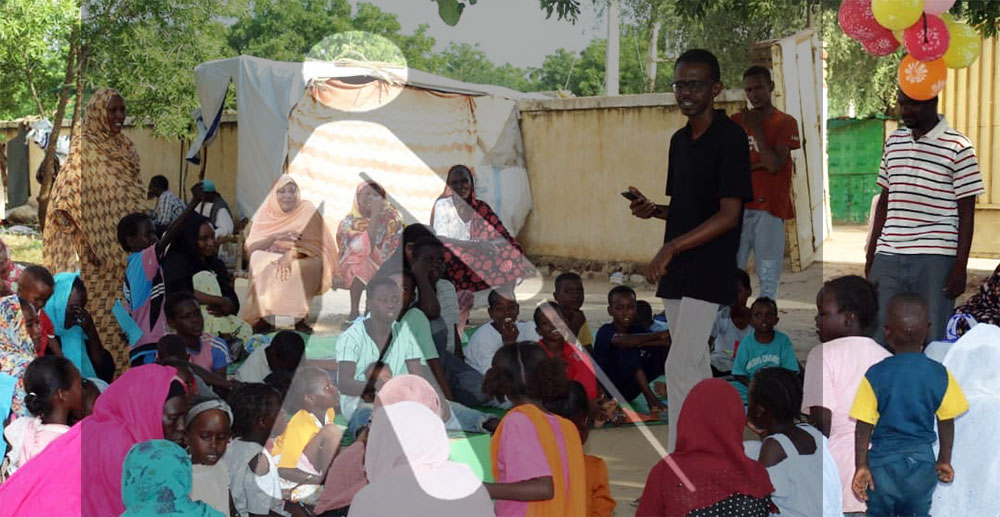
The Death Journey of the Blind from Madani to Kassala
Moatinoon - Rami Mohakkar
In June of last year, the Rapid Support Forces (RSF) took control of most of the critical public and private facilities in Khartoum State, using them as housing and bases for its soldiers. Among these places was the headquarters of “EYES Charity” for the Care of the Blind, located in Bahri, Al-Mughtaribeen neighborhood. The RSF looted all the money and belongings of the organization, as well as personal items of some blind members.
With the outbreak of the war on April 15, 2023, the Oyoun Charity for the Care of the Blind issued an appeal for the protection of people with special needs, particularly the blind. The organization highlighted their need for special arrangements to ensure their safety and requested secure routes to deliver aid to them. It also called for their evacuation from conflict areas using specially designated vehicles and for providing essential aid in less risky locations.
Nader Abu Al-Qasim, one of the supervisors of a shelter for the blind in Kassala State, revealed details of their suffering while fleeing Al-Jazeera State after the fall of Wad Madani to the RSF on December 15, 2023. He recalled hearing gunfire near the shelter on that day, forcing them to leave as bullets rained down upon them.
“We went to the Al-Daraja neighborhood to get away from the military headquarters,” Nader told (Moatinoon). "After the city fell, members of the militia entered and were told that we were blind and that the shelter belonged to us. They asked us to stay, assuring us that the situation was safe. But everyone was terrified, especially since we had girls with us and had heard many reports of rape incidents. So, we decided to leave for a safer area early in the morning without a guide.”
Nader noted that there were fifty families in the shelter. They walked to a location near the village of Suraiba. “We met a bus driver who advised us to head to Maringan and contact organizations to help us reach a safe city.”
They eventually reached a mosque in the Barakat area, which was also hosting displaced people. Nader added, “Unfortunately, an RSF member arrived and asked us to accompany him to another area at some distance from the mosque to receive aid. The three of us supervisors went along with the bus driver and his assistant. After traveling a long way, a militia group that had been following us stopped the bus, demanded that we get out, and accused us of being former regime loyalists (‘Kizan’), threatening and firing at us. They then took the bus, leaving us to walk back to the mosque, where we stayed for eleven days.”
Nader explained that all their attempts to negotiate with the RSF members to allow them to leave the state were met with rejection. “After multiple pleas, we managed to gather enough money to rent a bus to get us out of there. A commander named Abu Shotal finally agreed to let us go, saying we could reach Kassala. We contacted the bus owner, who arranged for a protective vehicle to accompany us to the last checkpoint so the bus wouldn’t be seized. At each checkpoint, we faced abuse and multiple inspections, with guards insisting we weren’t blind and accusing us of being intelligence agents. But thankfully, we finally made it to Kassala on January 1 of this year.”
Nader highlighted that many of the blind, particularly girls and children, continue to suffer psychological effects from their ordeal since the fall of Madani and their arduous journey out of the city. They are now staying in a school repurposed as a shelter for the blind in Kassala.
In Sudan, the Al-Noor Institute for the Education of the Blind was established in 1961 through a local initiative in collaboration with the German Lions organization. Initially under the Ministry of Social Welfare until 1968, it was later transferred to the Ministry of Education in 1994. It remains the only national institute in the country providing academic education for the visually impaired.
In previous reports, the Blind Union, founded in 1970, stated that in 2015, there were over half a million visually impaired people in Sudan, out of a population of 44 million.
In 1839, the Frenchman Louis Braille, inspired by his own visual impairment, devised a new method for educating the blind using six raised dots etched on paper that could be read by touch. Braille drew inspiration from the French military, which used a 12-dot tactile code to send encrypted messages to soldiers, enabling secure communication without risking enemy detection if a message was intercepted.
In November 2018, the United Nations officially recognized Braille as a global standard for educating the blind and designated January 4 each year as World Braille Day, promoting education for the visually impaired.

